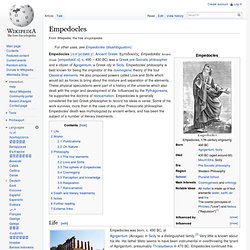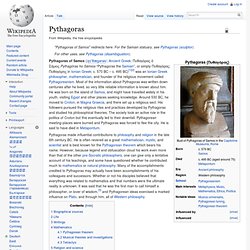

Anaxagoras. Anaxagoras (/ˌænækˈsæɡərəs/; Ancient Greek: Ἀναξαγόρας, Anaxagoras, "lord of the assembly"; c. 510 – 428 BC) was a Pre-Socratic Greek philosopher.

Born in Clazomenae in Asia Minor, Anaxagoras was the first philosopher to bring philosophy from Ionia to Athens. He attempted to give a scientific account of eclipses, meteors, rainbows, and the sun, which he described as a fiery mass larger than the Peloponnese. According to Diogenes Laertius and Plutarch, he fled to Lampsacus due to a backlash against his pupil Pericles. Anaxagoras is famous for introducing the cosmological concept of Nous (mind), as an ordering force. Democritus. Democritus (/dɪˈmɒkrɪtəs/; Greek: Δημόκριτος Dēmókritos, meaning "chosen of the people"; c. 460 – c. 370 BC) was an influential Ancient Greek pre-Socratic philosopher. He is primarily remembered today for his formulation of an atomic theory of the universe.[3] Democritus was born in Abdera, Thrace[4] around 460 BC. His exact contributions are difficult to disentangle from those of his mentor Leucippus, as they are often mentioned together in texts. Their speculation on atoms, taken from Leucippus, bears a passing and partial resemblance to the nineteenth-century understanding of atomic structure that has led some to regard Democritus as more of a scientist than other Greek philosophers; however, their ideas rested on very different bases.[5] Largely ignored in ancient Athens, Democritus was nevertheless well known to his fellow northern-born philosopher Aristotle.
Life[edit] After returning to his native land he occupied himself with natural philosophy. Protagoras. Background[edit] In Plato's Protagoras, before the company of Socrates, Prodicus, and Hippias, he states that he is old enough to be the father of any of them.

This suggests a date of not later than 490 BC. In the Meno he is said to have died at about the age of 70 after 40 years as a practicing Sophist.[3] His death, then, may be assumed to have occurred circa 420. He was well known in Athens and became a friend of Pericles.[4] Plutarch relates a story in which the two spend a whole day discussing an interesting point of legal responsibility, that probably involved a more philosophical question of causation:[5] "In an athletic contest a man had been accidentally hit and killed with a javelin. Philosophy[edit] Protagoras was also known as a teacher who addressed subjects connected to virtue and political life.
He also seems to have had an interest in “orthoepeia” - the correct use of words, although this topic is more strongly associated with his fellow sophist Prodicus. Empedocles. Empedocles (/ɛmˈpɛdəkliːz/; Ancient Greek: Ἐμπεδοκλῆς; Empedoklēs; Ancient Greek: [empedoklɛ̂ːs]; c. 490 – 430 BC) was a Greek pre-Socratic philosopher and a citizen of Agrigentum, a Greek city in Sicily.

Empedocles' philosophy is best known for being the originator of the cosmogenic theory of the four Classical elements. He also proposed powers called Love and Strife which would act as forces to bring about the mixture and separation of the elements. These physical speculations were part of a history of the universe which also dealt with the origin and development of life. Influenced by the Pythagoreans, he supported the doctrine of reincarnation. Empedocles is generally considered the last Greek philosopher to record his ideas in verse. Parmenides. Heraclitus. Heraclitus of Ephesus (/ˌhɛrəˈklaɪtəs/;[1] Greek: Ἡράκλειτος ὁ Ἐφέσιος, Hērákleitos ho Ephésios; c. 535 – c. 475 BCE) was a pre-Socratic Greek philosopher, a native of the Greek city Ephesus, Ionia, on the coast of Asia Minor.

He was of distinguished parentage. Little is known about his early life and education, but he regarded himself as self-taught and a pioneer of wisdom. From the lonely life he led, and still more from the riddling nature of his philosophy and his contempt for humankind in general, he was called "The Obscure" and the "Weeping Philosopher". Heraclitus is famous for his insistence on ever-present change in the universe, as stated in the famous saying, "No man ever steps in the same river twice"[2] (see panta rhei, below). He believed in the unity of opposites, stating that "the path up and down are one and the same", all existing entities being characterized by pairs of contrary properties. Pythagoras. Pythagoras of Samos (/pɪˈθæɡərəs/; Ancient Greek: Πυθαγόρας ὁ Σάμιος Pythagóras ho Sámios “Pythagoras the Samian”, or simply Πυθαγόρας; Πυθαγόρης in Ionian Greek; c. 570 BC – c. 495 BC)[1][2] was an Ionian Greek philosopher, mathematician, and founder of the religious movement called Pythagoreanism.

Most of the information about Pythagoras was written down centuries after he lived, so very little reliable information is known about him. He was born on the island of Samos, and might have travelled widely in his youth, visiting Egypt and other places seeking knowledge. Around 530 BC, he moved to Croton, in Magna Graecia, and there set up a religious sect. His followers pursued the religious rites and practices developed by Pythagoras and studied his philosophical theories.
The society took an active role in the politics of Croton but this eventually led to their downfall. Pythagoras made influential contributions to philosophy and religion in the late 6th century BC. Biographical sources. Democritus.